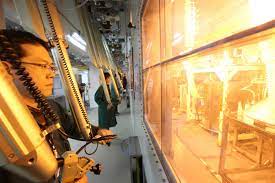South Korea, like the United States, has long relied on nuclear power as a major source of electric power. As a result, it has amassed large stores of spent nuclear fuel and, as in the United States, has experienced political pushback from populations around proposed central sites for the spent fuel.
South Korea also has a history of interest in nuclear weapons to deter North Korean attack. South Korea’s interest in spent fuel disposal and in a nuclear-weapon option account for the Korea Atomic Energy Research Institute’s dogged interest in the separation of plutonium from its spent fuel. Plutonium separated from spent fuel can be used to make nuclear weapons.
Two US Energy Department nuclear laboratories, Argonne National Laboratory and the Idaho National Laboratory have encouraged South Korea’s interest in plutonium separation because of their own interests in the process. Now, a secret, leaked, joint South Korean-US report shows deliberate blindness to the economic and proliferation concerns associated with plutonium separation and lays the basis for policies that would put South Korea on the threshold of being a nuclear-weapon state.
Japan is the only non-nuclear-armed state that separates plutonium. The Korea Atomic Energy Research Institute has domestic political support, however, for its demand that South Korea have the same right to separate plutonium as Japan.
In 2001 Argonne and Idaho National Laboratories (INL) persuaded an energy-policy task force led by then-Vice President Dick Cheney that pyroprocessing is “proliferation resistant” because the extracted plutonium is impure and unsuitable for nuclear weapons. On that basis, Argonne and INL were allowed to launch a collaboration on pyroprocessing research and development with Korea. The Korea Atomic Energy Research Institute was enthusiastic. It had been blocked from pursuing reprocessing R&D since it had been discovered in 1974 that the institute was part of a nuclear-weapon program.
At the end of the Bush administration, however, nonproliferation experts from six US national laboratories, including Argonne and INL, concluded that pyroprocessing is not significantly more proliferation resistant than conventional reprocessing because it would be relatively easy to remove the weakly radioactive impurities from the plutonium separated by pyroprocessing. The finding that pyroprocessing is not proliferation resistant precipitated a struggle between the Obama administration and South Korea’s government during their negotiations for a new US-Republic of Korea Agreement of Cooperation on the Peaceful Uses of Nuclear Energy. The new agreement was required to replace the existing agreement, which was due to expire in 2014. But the negotiations stalemated when South Korea demanded the same right to reprocess the Reagan administration had granted Japan in 1987.
At the beginning of September 2021, INL and the Korea Atomic Energy Research Institute submitted a 10-year report on their joint fuel cycle study. Instead of making a policy recommendation on the future of pyroprocessing, however, the Korea-US Joint Nuclear Fuel Cycle Research Steering Committee decided to continue the joint research. A senior US official with knowledge of the situation, told that “at least three or four more years will be necessary for the two governments to be in a position to draw any actual conclusions related to the technical and economic feasibility and nonproliferation acceptability of pyroprocessing on the Korean Peninsula.”
Excerpts from Frank N. von Hippel, Jungmin Kang, Why joint US-South Korean research on plutonium separation raises nuclear proliferation danger, January 13, 2022
